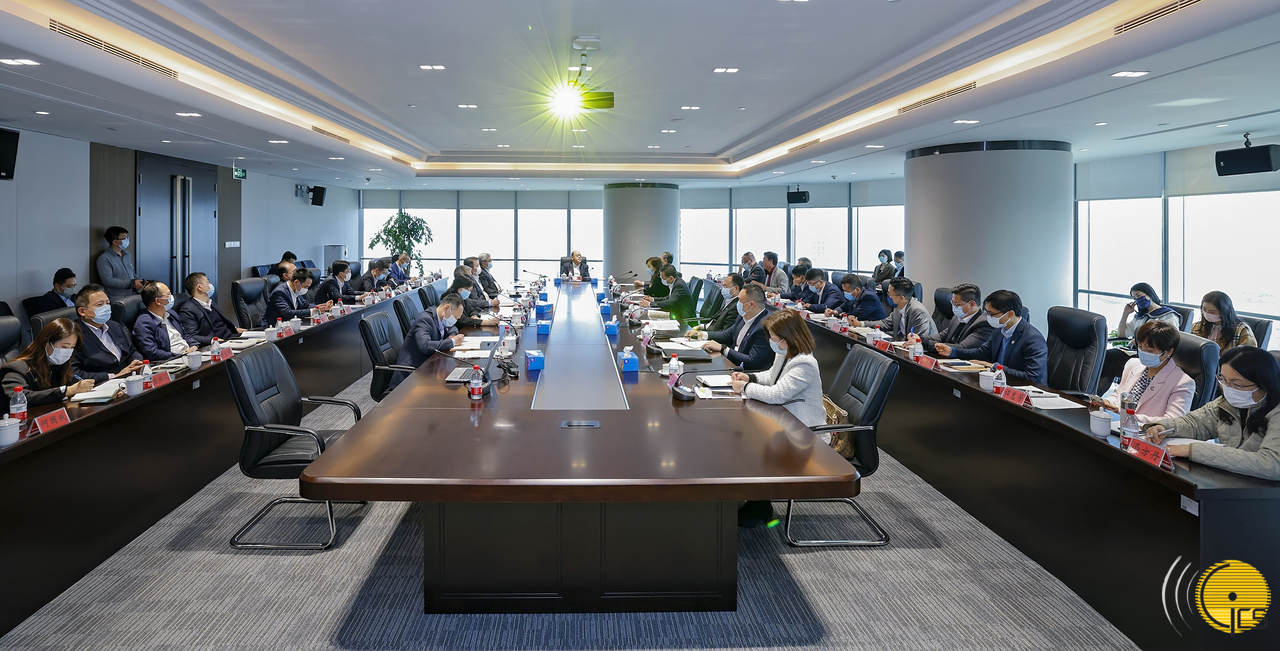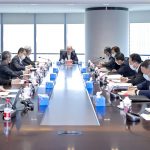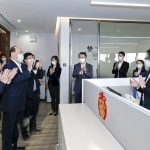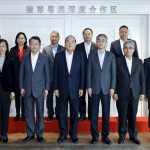 The Chief Executive, Mr Ho Iat Seng, is in Hengqin for a Spring Festival gathering hosted by the Administrative Committee and the Executive Committee of the Guangdong-Macao Intensive Cooperation Zone in Hengqin.
The Chief Executive, Mr Ho Iat Seng, is in Hengqin for a Spring Festival gathering hosted by the Administrative Committee and the Executive Committee of the Guangdong-Macao Intensive Cooperation Zone in Hengqin.
The Chief Executive, Mr Ho Iat Seng, said Guangdong and Macao would work closely together to create in a pragmatic way a greater number of innovative cooperation models and mechanisms, in order to speed advances and achieve planned goals for the Guangdong-Macao Intensive Cooperation Zone in Hengqin.
Mr Ho made the remarks on Monday (14 February) while visiting the Cooperation Zone, for a Spring Festival meeting with officials from the Cooperation Zone’s Administrative Committee and its Executive Committee.
Mr Ho mentioned a total of 12 agreements on major projects covering: integrated circuit; electronic information; biomedicine; traditional Chinese medicine; “big health” industry; and modern financial service work, had been signed in December 2021. Mr Ho added he looked forward to seeing more concrete steps being made in relation to those topics, in order to accelerate high-quality development of the Cooperation Zone.
In Monday’s meeting, the Chief Executive shared with those present four points regarding the development of the Cooperation Zone.
The first was that those involved should hold firmly to the original mission for the development of the Cooperation Zone and optimise top-level design. Mr Ho mentioned that President Xi Jinping had pointed out a clear path for the development of the Cooperation Zone, via four strategic positions, i.e. a new platform for promoting Macao’s adequate economic diversification; a new space in which Macao residents could live and work; a new showcase to enrich the implementation of the “One country, two systems” principle; and a new high ground for promoting development of the Guangdong-Hong Kong-Macao Greater Bay Area.
Projects and work planned for the Cooperation Zone should be in line with the four strategic positions, said Mr Ho. This was to ensure adherence to the central mission, namely the promotion of the adequate economic diversification of Macao. Mr Ho said a stronger sense of innovation and experimentation, and a pioneering approach, were required to fulfil such a mission.
The second of Mr Ho’s four points was the need to pursue further work on the rules and mechanisms to connect Macao and the Cooperation Zone in Hengqin. This was in order to ensure the respective advantages of the two places worked together in a complementary way, and to strengthen the regulatory-system setup. Mr Ho noted the Cooperation Zone’s Executive Committee had already established stable and smooth operations. He said the next step should be to focus on research of, and comparison between, the regulatory systems in Macao and Hengqin.
Mr Ho said the Cooperation Zone should also dedicate further effort to advancing connections between the financial services of Macao and Hengqin, and their civil and commercial administration systems. Introduction of court services with Macao characteristics to handle civil and commercial matters was also necessary, he added.
The third point was that fresh progress was required regarding attraction of businesses and investment to the Cooperation Zone, and regarding construction of projects there. It was necessary to build a first-class team to work on bringing in businesses, and to set up a database for attracting large-scale business projects to the Cooperation Zone, in particular projects covering integrated circuits, biomedicine, new energies, and new materials. Further effort should be made to accelerate key projects for the Cooperation Zone, such as building a computing platform, and creating a centre of technological innovation in traditional Chinese medicine.
Mr Ho also mentioned greater effort was needed to attract to the Cooperation Zone a greater number of skilled professionals, while ensuring its needs for general labour were also met.
Mr Ho’s fourth point was the need to encourage dynamism in the team working in the Cooperation Zone, and the efficiency of entrepreneurship there. Implementation of Cooperation Zone-related policies depended on the people involved in it, and the stability, cohesion, and vitality of its Executive Committee. Appointment of supporting staff should be based on individuals’ ability and merit, and the need to encourage a think-outside-the-box spirit, to create a pioneering atmosphere and efficient effort.
The Chief Executive called on personnel commissioned by the Macao Special Administrative Region (MSAR) Government to take part in the Cooperation Zone, to learn from their co-workers from Guangdong Province, and to draw attention to the regulatory advantages enjoyed by Macao, in order to promote for the Cooperation Zone the guiding principle “Mutual Discussion, Joint Construction, Joint Administration and Shared Benefits”.
After Monday’s meeting, Mr Ho visited the offices respectively of the Executive Committee, and bodies of the Guangdong Government there, to offer festive greetings to the staff. He called on them to stay true to the key missions of the Cooperation Zone, i.e., to assist in Macao’s adequate economic diversification; and realise the Cooperation Zone’s guiding principle of “Mutual Discussion, Joint Construction, Joint Administration and Shared Benefits”. This in turn would promote steady implementation in Macao of the “One country, two systems” principle.





